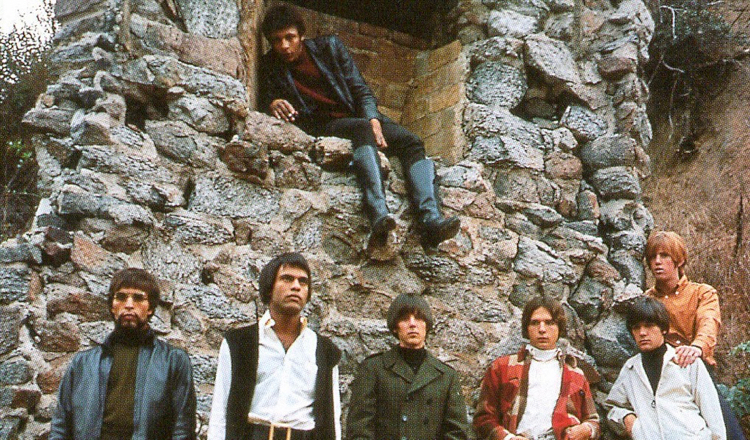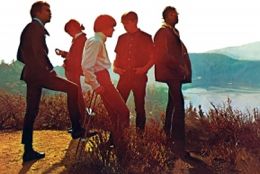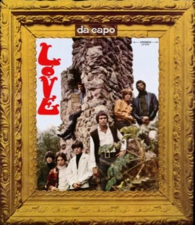
Seconds into the opening track, “Stephanie Knows Who,” it’s clear that “Da Capo” represented new directions for Love and for rock.
A harpsichord dances with guitar in the lovely prelude. A deep-throated sax breaks in. In the break, all of the song’s instruments collide and veer off in different directions. The resulting passage is more in tune with free jazz than psychedelic music — although this is unmistakably a hard rock song.
“Da Capo” was Arthur Lee and Love’s second album, out of three made with his core group of L.A. musicians. The album was followed and overshadowed by the rock masterpiece “Forever Changes,” but the songs here are streaked with brilliance and innovation. Many musicians’ minds were blown by its collage of sounds and crazyquilt of influences, the material clearly ahead of its time.

“Da Capo” is, in a sense, a more adventurous album than “Forever Changes.” In any case, these tracks are among the finest recordings of Love as musicians. (Key parts of “Forever Changes” were played by hired hands.)
The band had expanded to seven players, upgraded its drummer, added woodwinds and, of all things, integrated a harpsichord. The first side of “Da Capo” is a lovely experiment in fusing sounds from rock, Latin rhythms, jazz and classical. Lee and company succeed at this without pandering, producing some of their best songs. The second side of “Da Capo,” alas, is dedicated entirely to the notorious jam “Revelation,” which has done great damage to the otherwise brilliant album’s rep.
“Seven & Seven Is” could be the most explosive 2 1/2 minutes in ’60s rock. When rocks fans think of Love, they usually conjure up “Forever Changes,” “My Little Red Book” and this frantic yet somehow cohesive piece. The rage of drums, bass and guitar gives way to the sound of an atomic bomb explosion, accompanied by a jazzy soft guitar. The a-bomb apparently had nothing to do with the song’s content, a visit to Lee’s family living room. The song anticipates punk rock and sonic anarchy. A work that’s forever cool. “Seven & Seven Is” was covered by the Ramones and Alice Cooper among many others.

Legend has it that Lee and the band’s original percussionist, Snoopy Pfisterer, alternated playing the difficult and exhausting drum part, with no one sure whose work appears on the album. Some versions of the album have a version of the song preceded by 50 seconds of studio patter that captures Lee’s frustration with “take 77.” (Pfisterer, classically trained, moved to harpsichord and organ for this album.)
“Orange Skies,” from the band’s terrific second songwriter Bryan MacLean, brings us the delightfully trippy lyric “Orange skies, carnivals and cotton candy and you.” Touches of samba with Tijay Cantrelli’s flute as the lead instrument. “Que Vida!” continues the theme, with a B3 organ streaming below the surface.
“The Castle” shows off the chops of new drummer Michael Stewart and features a jangly take on Spanish fingerpicked guitar. Listen for the quick detour into dissonance.
“She Comes in Colors” is Love’s version of a power ballad. A flute drifts over the love song, sung with precision by Lee. About 20 seconds in, the song shifts from an easy tempo to barely restrained rock. The harpsichord returns midway though. “My love she comes in colors,” Lee sings over and over. “You can tell her from the clothes she wears.” The care and precision in the production foreshadow “Forever Changes.” Keith Richards said “She Comes in Colors” inspired the Stones’ “She’s a Rainbow.”
The 19-minute “Revelation,” a bluesy/R&B jam that by most accounts Lee and the band came to regret using on the album. It’s all pretty much downhill from the harpsichord intro. There are some good moments about six minutes in, with some Eastern-sounding guitar chops most likely influenced by the Butterfield Blues Band’s “East-West.” (The post-Lee version of Love, with guitarist Johnny Echols, played a stripped-down version of “Revelation” in concert in the summer of 2011.)
At times, the jam brings to mind the Stones or Love’s labelmates the Doors, who debuted that year and were big fans of Arthur Lee’s band. (“Stephanie Knows Who” certainly influenced the Doors’ later “Touch Me,” although that might be producer Paul Rothchild repeating himself.) Yes, there’s a drum solo in “Revelation,” but it’s mercifully brief. Since the core version of Love made only three albums, the loss of a side to filler stings. (Though the laziness probably routed several great songs to “Forever Changes.”)
Liner notes: The album was rereleased several years ago, as a Rhino/WEA import. It offers mono and stereo versions of “Da Capo.” There’s also a collectors put out by Sundazed. Update: And then came an excellent hybrid SACD from Mobile Fidelity, which was out of print by late 2020.
Rhino’s “Love Story: 1966-1972” provides a good overview of the original band’s recordings.
People who already fans of this groundbreaking band should check out the fine biography “Forever Changes: Arthur Lee and the Book of Love.”
On DVD, there’s “Love Story,” a documentary about the band made in Lee’s final years. He participated fully with the filmmakers.
When I was a teenager back in the 80’s, I went with my best friend to his grandparents’ house. The attic room where his mom and uncle grew up looked like a 60’s time capsule. There was a Cry Baby Wah-Wah Pedal, a TV Guide from when ‘Rowan & Martin’s Laugh-In’ was the biggest thing on the tube, and a treasure chest of vinyl, including a mint-condition copy of Love’s ‘Da Capo.’It seemed like it hadn’t been pulled out of the jacket more than once or twice. I was looking at it like it was the Holy Grail (I swear I remember it glowing). My friend said, “You can have it if you want it.”
With all the junk in that room the one thing that was missing was a record player, so I had to wait until I got home to listen to it. The only thing I knew from it at the time was “7 & 7 Is,” so I was in for a real treat. From that opening harpsichord on “Stephanie Knows Who,” I was transported to a Psychedelic Wonderland. Each song blew my mind a little further than the last, culminating with “She Comes In Colors,” which I thought was mesmerizing. I was less impressed with Side 2’s sprawling “Revelation,” and have really only listened to the full 19 minutes a handful of times, but Side 1 more than makes up for that mediocrity.
Arthur Lee was a rare talent, painting some of the most beautiful landscapes ever to grace the canvas of vinyl (and Bryan MacLean was also a fantastic, if less prolific, songwriter.) And you were right, Abel, this definitely represented a new direction for the band. The creative and artistic jump between the eponymous debut and ‘Da Capo’ is almost on a Beatles level (like ‘Rubber Soul’ to ‘Revolver’). If you eliminated “Revelation,” you would probably have the greatest EP in the history of Rock-N-Roll.
I have always loved Side One of Da Capo. It was a logical extension of their first album. But Revelation was hard to listen to, sounded like they were trying to sound like the Door’s The End. By the way, check out Love’s first album — It contains some great music. Peace …
Forever Changes was not played mostly by hired hands, only partly. The group was in such a poor state that session pros were brought in for two tracks. This reportedly shamed the boys into recommitting themselves to the remainder of the album.
I may also be the only person on earth who isn’t bothered by REVELATION. They tried to stretch, why not give them credit? Plus Paul Rothchild reedited the track, violating its catch the feel of a live set credo.
I want to address the fact that many people think that Love “Forever Changes” is a psychedelic album. Granted the album came out in November of 1967, and the art work by Bob Pepper can certainly be considered psychedelic, the music however is not. That doesn’t take anything away from the album. “Forever Changes” is one of my top 10 albums, great music, great lyrics, but the music is not psychedelic. It’s pop, it’s rock and R&B.
Pink Floyd, “Piper at the Gates of Dawn” is psychedelic, as is 13th Floor Elevators “Easter Everywhere.” Love’s “Da Capo” has more right to be considered psychedelic. Check out “Stephanie Knows Who” or “Signed D.C.” Just had to put that out there.
Side One is brilliant. Can’t get on with Revelation
Some days I like it better than Forever Changes.
Revelation stops it being a great album. Revelation is interesting to listen to a couple of times but that’s it. I now never turn the album over.
I think a much better album than people rate it. … Actually prefer this to Forever Changes.
Fun fact: Love was Jim Morrison’s favourite band.
Revelation was NOT “filler”. Those of us who know the band’s history know it was a regular part of their stage act, also known as “John Lee Hooker”. Always sad when people spout off on a band without doing their homework. So here goes: this album represents the usual set you would have heard from this band if you had been lucky enough to have been at Ciro’s in 1965.
Yet, Norman, it still sucks. A whole side worth of suck.
Homework? Let’s hear from the band.
Snoopy Pfisterer, who played the intro: “I actually think ‘Revelation’ is a piece of shit. A waste of an entire side of an album.”
Johnny Echols: “Revelation” was “a mishmash (botched by the producer) … never should have been captured in the studio. … A disappointment. … A whole side of noise.”
Arthur Lee: “The worst we ever played it.”
Echols adds that it was used against the band’s wishes to fill out the album because Elektra didn’t want to pay for more studio time.
(from the book “Forever Changes” by John Einarson, pages 143, 144).